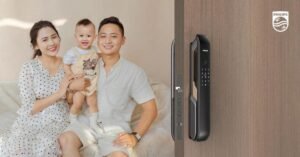It’s not shocking that our homes have gotten more high-tech in this age of widespread computing. The days when we could feel secure in our houses with only a key and lock are long gone. Smart locks are changing the industry by giving homeowners more freedom and security. There has been a rise in the use of smart locks. A smart lock is a smart electronic door-locking system. Door entry is granted by Bluetooth or Wi-Fi from a nearby smartphone, doing away with the need to physically turn an outside lock.
Before putting smart locks in your home, it’s crucial to think about the advantages they provide. Let’s go into the world of customer stories to see how these creative devices have altered the face of home safety. Furthermore, Philips smart locks must be considered while discussing the importance of smart locks since they are both incredibly unique and essential.
Can a Smart Lock Still Open Without Internet Connection?
Even if your home’s electricity or internet suddenly goes off, most smart locks will still function normally. Your system will likely include a backup key, fingerprint scanner, or keypad entry method to allow for manual door unlocking in case of emergency. If your smart lock also supports Bluetooth, you can open the door from anywhere in the distance.
Benefits of Smart Locks:
Some benefits of smart locks are below.
- Leaving Keys:
The ability to enter your house without a key is an essential benefit of smart locks. You’ll never have to search for your keys again or worry about them being stolen.
- Remote Entry:
Many modern door locks may be locked and unlocked through a mobile app on your smartphone. This option comes in handy when you’re away but want to let in people like family, friends, or service providers. Moreover, the Philips smart lock is also the best option for investors because it has high security.
- The Automation
When you leave the home, you may have the lights and doors locked automatically.
- Records of Past Availability:
A record of who visited and left your house at what times is kept by smart locks. It may help keep an eye on the kids and keep an eye on the home.
Drawbacks of Smart Locks:
Some drawbacks of smart locks are below.
- Spending More Money:
In most cases, the initial cost of a smart lock will be more than a conventional wave’s. All necessary hardware for remote access to the safety is included in this price.
- Dangers of Hacking:
Even though smart locks are manufactured to prevent unauthorized entry, there is always a chance that someone may hack into one. It is less likely to happen with well-known manufacturers.
- Frequently Swapping Out Your Batteries:
If you need to remember to change the batteries in your smart lock and get locked out, that’s a hassle.
- Complexity:
Setting up and utilizing smart locks and related applications might have been difficult for specific users, particularly those less computer-aware.
How Do Smart Locks Differ From Traditional Locks?
In short, a regular lock is any old lock that has to be opened manually using a key. In contrast, many modern smart locks do away with the need for keys altogether while providing convenient access to a wide range of valuable functions.
Locking and unlocking the door may be done quickly and easily using your phone, voice commands, or a Bluetooth key fob. Compared to conventional locks, smart locks are significantly challenging to get into by picking or hacking. You may be sure your locks are secure as long as you protect your Wi-Fi network, use robust passcodes, and don’t tell anybody else about them. Smart locks are convenient since they eliminate the common problem of misplacing keys. Smart locks are suitable since they eliminate the need for a separate key ring.
Features of Smart Locks
Smart locks are a cutting-edge and practical upgrade for any home security system. Moreover, the Philips smart lock is also the best option because it has high security. Several distinctive qualities set them apart from conventional locks.
Smart locks have the following essential features:
- Customized Login:
You may program distinct access codes or digital keys for each user with a smart lock. Guests, service providers, and contractors may be granted temporary access using this functionality, and it can be revoked when they are no longer required.
- Battery-Powered:
The vast majority of modern smart locks run on rechargeable batteries. However, to prevent getting locked out due to a dead battery, keeping track of the battery life and changing batteries as required is crucial.
- Physical Stability:
Smart locks are built to last and are physically secure and resistant to attack. Look for models awarded security certifications to guarantee they are up to level with other products.
- Multi-User Capability:
Most modern smart locks can add numerous users with varying degrees of access. It is helpful in many settings, including households, offices, and dormitories.
- Using Your Voice as the Remote:
It is possible to control some smart locks by using a voice assistant. You may now secure your home with the sound of your voice.
How Long Is Smart Lock?
Protecting the security of your home or business has never been easier than with a smart lock. You need to know everything about smart locks if you want to make it in the business. If you need a trustworthy maker, Philips is a great choice. However, the issue is how long the smart lock will remain functional. The answer to this question depends on several factors. We also have a few ideas on how to keep your smart lock functioning for as long as possible.
Can a Smart Lock Be Hacked Easily?
The security of a smart lock is highly dependent on how well its features are designed and implemented, as is the case with any technological system. Reliable connections and up-to-date encryption technologies are standard practices for reputable smart lock manufacturers.
Smart locks use wireless protocols like Bluetooth, Zigbee, and Wi-Fi to interact with your smartphone or a central hub; these connections are typically secured.
Moreover, the Philips smart lock is also the best option because it has high security. It makes it difficult for anybody without the encryption key to “hack” the safety.
Two-factor authentication, biometric identification, and tamper warnings are a few of the cutting-edge security features that smart locks use. However, there is no perfect system. When opposed to conventional locks, which can be picked or banged open with a bit of practice and the correct equipment, the probability of a smart lock being hacked is low but possible.
Most would-be attackers will only try to hack a smart lock if doing so requires high technical expertise and expensive equipment.
Customers Stories about Smart Locks:
Some customers experienced significant improvements in their home security after installing smart locks.
- Professional Customers Who Are Always On the Go:
Some of our customers, who are also professionals with hectic morning schedules, used to stress out over remembering to lock their doors. They can close and open their entry using their smartphone and a smart lock. They feel safe and in charge of their house even when they are far away on business travel since they are alerted whenever someone enters.
- The Unaware Property Owner:
The customer often misplaced or forgot to bring his residence keys. This problem was resolved thanks to smart locks. Customer now either enters his house with a keypad code or his smartphone. He may give authorized individuals access without giving them his own set of keys, and he can stop worrying about losing or giving away keys altogether.
- A Traveler’s Tale:
Some consumers wanted to feel safe leaving their house for an extended period yet still enjoy traveling. Smart locks with built-in cameras were fitted. They can check in on their pets and packages while they’re away, thanks to the ability to remotely monitor the front entrance and get notifications about suspicious behavior.
- Technology Fan:
A tech fanatic customer wants to combine all his smart gadgets into a single system. A smart home hub allows him to efficiently manage his house’s lighting, temperature, and smart lock. With this incorporation, customer may set up individualized safety routines, such as locking all doors and turning on motion detectors before bed.
In What Kinds of Places may You Find Smart Locks in Use?
Without the need for a standard key, a homeowner of a smart house can let people into their home and enter it themselves using the property’s smart locks. On the other hand, the user may use a key ring or smartphone to verify their identity and open the door mechanically wirelessly.
When Will the Battery Life Estimate be Available?
The manufacturer often provides the expected battery life of a smart lock. This estimate is based on average use, although it might fluctuate depending on the lock’s quality and frequency. The average battery life of a smart lock is between six months and two years. Some high-tech locks have rechargeable batteries that can continue for years.
Conclusion
As seen by these customer reviews, smart locks have revolutionized home security by giving homeowners more flexibility, options, and convenience. Smart locks have quickly become a standard component of today’s home security systems because they streamline everyday living and protect family and valuables.
Consider your wants and preferences when deciding which smart lock functions are most essential. Remember that the protection and convenience provided by smart locks might vary by model and brand, so do your homework and choose one that meets your needs. However, the Philips smart lock, which employs state-of-the-art technology, is your best choice for your home’s security.




